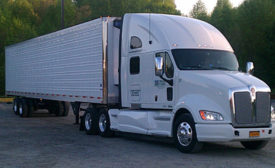Home » supply chain trends
Articles Tagged with ''supply chain trends''
The growing number of food fraud cases is a driving factor in growth of blockchain technology.
Read More
Study: Autonomous trucks gain ground in U.S. logistics
For carriers, autonomous trucks are likely to bring disruption to operating models, cost structures and economic models.
January 1, 2019
Food safety tips for food, beverage manufacturers managing complex supply chains
As the food supply chain becomes more global and complex, food safety issues tend to be more far-reaching than those experienced decades ago.
December 18, 2018
Survey: Retailers making serious investments in supply chain efficiency
Research shows that retail winners are confidently investing in new data and technologies to improve their supply chain through better forecasting and execution.
December 6, 2018
Survey: U.S. logistics, transportation industry optimistic regarding economy, hiring, revenues, profitability
However, there is still concern with inflationary pressures.
November 14, 2018
How blockchain improves transparency & food safety
Using blockchain technology can drastically improve the transparency of food and beverage origins and stops along the supply chain.
November 9, 2018
Blockchain’s role in creating colder, fresher, safer food supply chain
Even though blockchain maturity is several years away, now is the time for companies to become educated on how it can lead to vast improvements in the food supply chain.
November 9, 2018
Blockchain for the food supply chain
As blockchain pilots for the food supply chain continue to move into production, the positive impact is already palpable.
November 9, 2018
Blockchain for the food industry—Wishful thinking or disruptive investment?
Blockchain provides a way to digitize every step of the supply chain through a distributed, connected ledger, linking all records from source to shelf.
November 9, 2018
Elevate your expertise in refrigerated and frozen foods with unparalleled insights and connections.
Get the latest industry updates tailored your way.
JOIN TODAY!Copyright ©2024. All Rights Reserved BNP Media.
Design, CMS, Hosting & Web Development :: ePublishing








